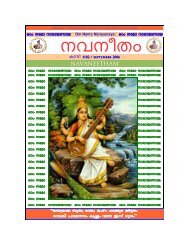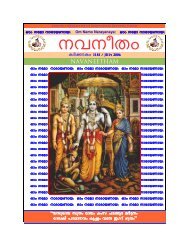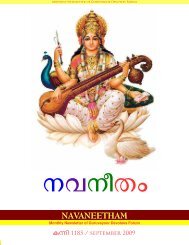Navaneetham - Guruvayoor / Guruvayur
Navaneetham - Guruvayoor / Guruvayur
Navaneetham - Guruvayoor / Guruvayur
You also want an ePaper? Increase the reach of your titles
YUMPU automatically turns print PDFs into web optimized ePapers that Google loves.
pÉ! g¡L¬« Qc¡c¡« pÉ! g¡L¬« Qc¡c¡« pÉ! g¡L¬« Qc¡c¡« pÉ! g¡L¬« Qc¡c¡«<br />
|| Om Namo Narayanaya ||<br />
Bhagavad Gita<br />
Veena Nair<br />
[A brief recap of the previous units before I move on to Chapter 3. My main references are –i) the Geeta<br />
chapters in English, by Swami Chinmayananda and ii)the English translation of the Geeta bhashya of Adi<br />
Shankaracharya, by Dr. A. G. Krishna Warrier, published by Ramakrishna Math, Mylapore, Chennai.]<br />
Swami Chinmayananda explains the symbolic meaning of the Mahabharata war and the<br />
Geeta thus: A constant war is being waged in each one of us in all the critical moments of<br />
our lives. The negative tendencies within us are strong and raise their head time and again<br />
and are more effective than the diviner forces. Hence often times, each one of us feel the<br />
desperation and confusion that Arjuna felt. In the Kathopanishad, there is an analogy to<br />
the chariot—the body is the chariot and it is pulled forward by the five horses in the form<br />
of the five senses; the ideal charioteer is “the intellect” that can discriminate amongst the<br />
senses and drives the chariot and it’s Lord, the ego, to the proper destination, i.e. unity<br />
with God, a state of sat-chit-ananda.<br />
The Geeta starts with the word “Dharma” and ends with the word “Mama” meaning<br />
“mine”. The subject of the Geeta is therefore “My Dharma”. The root of the word<br />
“Dharma” is ‘Dhar’ meaning to support—Dharma therefore means “that which binds the<br />
different aspects and qualities of an object to form a whole”, in other words, “that which<br />
makes a thing what it is”. For example, it is the Dharma of fire to burn, of the Sun to give<br />
heat and light. The Geeta is the divine song or the guide by means of which, each one of<br />
us can realize our Dharma.<br />
In the first chapter of the BhagavadGeeta, Arjuna, the warrior is facing a massive army<br />
that includes his dear and near relatives, including cousins and uncles as well as Guru<br />
Drona and Pitamaha Bheeshma. True to his human nature, Arjuna is in a dilemma – to<br />
fight or not to fight? On one hand are the unfair and wicked practices of his cousin<br />
Duryodhana supported by his brothers and his father, the blind King of Hastinapur,<br />
Dhritarashtra. On the other hand, at stake is ‘Dharma’ – everything that is right and just<br />
in the world. At the beginning of chapter 2, a despondent and dismayed Arjuna<br />
surrenders to his charioteer and divine friend Krishna –<br />
kaarpanya doshopa hata svabhaavaha<br />
prucchaami tvaam dharma sammudha chetaha<br />
yacchreyah syaan nischitam bruhi tan me<br />
shishyaste ham shaadi maam tvaam prapannam || 2.7 ||<br />
“My heart is overcome by the taint of pity and my mind is confused as to duty. I ask You,<br />
tell me decisively, what is good for me. I am thy disciple. Instruct me, for I have taken<br />
refuge in Thee”.<br />
\h\oXw www.guruvayoor.com/<strong>Navaneetham</strong> Page- 52





